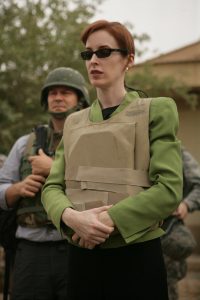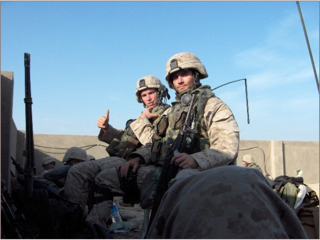Column: Marines say new fight for Fallujah sparks anguish over Iraq war
Watching TV images of Iraqi forces advancing on the ISIS-controlled city of Fallujah and U.S. airstrikes raining down from the sky is a bitter pill to swallow for many veterans of the Iraq war.
In 2004, some 125 American troops, mostly Marines, lost their lives in two brutal U.S. offensives to clear the city of Sunni insurgents. They were the bloodiest engagements of the entire eight-year Iraq war. Now a much smaller number of U.S. forces are back for what promises to be another ugly battle.
“When ISIS took over Fallujah two years ago, there was an existential debate among us: Had our fight been in vain?” said Elliot Ackerman, a novelist and writer who led a Marine platoon in the second 2004 battle in November and December. He said today’s fighting has reignited the same anguish Marines felt when ISIS hoisted its black flag over Fallujah’s city hall in January 2014.
“The renewal of this fight — it’s like watching helicopters taking off from the roof of the U.S. Embassy in Vietnam.”“For me, to say our battles there were in vain is to dishonor what we did and how well we fought,” Ackerman said. “But symbolically, what’s happening is disturbing. The renewal of this fight — it’s like watching helicopters taking off from the roof of the U.S. Embassy in Vietnam.”
Marines used to feel pride, not humiliation or anger, over the two Battles of Fallujah in April and November/December 2004. In Marine lore, those offensives are often called “iconic” because of their tactical success. There, Marines prevailed in the first American house-to-house urban fighting since the 1968 Battle of Hue in Vietnam.

Dr. Meghan O’Sullivan, senior fellow at Harvard Kennedy School, is briefed by U.S. Marines with Personal Security Detachment, I Marine Expeditionary Force (I MEF), at the Rotunda aboard Camp Fallujah in Iraq in 2008. Photo by Lance Cpl. Lindsay L. Sayres/U.S. Marine Corps
But it also marked another more ominous “first”: For the first time, U.S. forces were fighting not just remnants of Saddam Hassein’s forces, but Sunni insurgents. Under the Americans’ eyes, those fighters were merging with a new outfit calling itself al-Qaida in Iraq, led by a violent leader who specialized in bombings and beheadings, Abu Musab al-Zarqawi. This group would eventually morph into what is now America’s arch-target: ISIS.
“Fallujah was a disaster of historic proportions only now being appreciated,” said former Marine captain and historian Bing West, a Vietnam veteran who accompanied the Marines in both 2004 battles.
President Bush ordered the first April offensive after four Blackwater contractors were burned and hung from a bridge. He did so over the objections of Gen. James Mattis, the No. 2 Marine commander in Iraq. Their assignment: to root all extremists from the city. Yet five days after the assault began, the top civilian in Baghdad, Coaliton Provisional Authority chief Paul Bremer, announced a cease-fire, and Marine forces soon withdrew.
“You don’t order Marines to take a city of 300,000, and when they’re on the verge of taking it, order them to stop,” West said. “It sent a fatal signal. General Mattis had Zarqawi trapped, and President Bush lost his nerve.” West argues that gave Zarqawi six months of sanctuary in Fallujah as a base to foment sectarian attacks like the bombing of the Shiite shrine in Karbala, “laying the ground for the Sunni-Shia civil war that tore Iraq apart.”
Not so fast, said Meghan O’Sullivan, who was a top aide to Bremer in Baghdad. “Then, our No. 1 priority was to keep the political process going. Political progress was to be the driver of security success, not the other way around.” The Fallujah assault suddenly threatened the fragile negotiations underway to bring about elections. “Sunni leaders and even [U.N. special envoy] Lakhdar Brahami were threatening to resign if the Fallujah offensive didn’t stop.” The president had no choice but to suspend the fighting, she said.
Whatever the wisdom of President Bush’s calls, former Army lieutenant colonel and counter-insurgency expert John Nagl — who was commanding U.S. forces in a nearby town — said Fallujah was an eye opener to determination of a new breed of extremist forces, foreshadowing what the U.S. is fighting today.

Elliot Ackerman (left) calls in an airstrike during the battle of Fallujah in April 2004. Photo courtesy of Elliot Ackerman
“It showed us their ferocity. In Fallujah, for the first time, radical Islamic extremists took ground, held ground and were willing to die for it,” Nagl said. “It was a precursor to ISIS. Fallujah was an inspiration to ISIS to have a caliphate and a capital from which to run it.”
That November, the president ordered U.S. forces to return for a deadly battle that cleared the city at a cost of 95 American lives.
Asked about how he feels today watching the U.S. returning to Fallujah, Nagl snapped: “Livid … livid at the policy mistakes that forced us to fight there again.”
“This wasn’t a careless effort,” O’Sullivan said. “But I can understand the feeling among those who fought that, ‘Hey, if you’re going to risk our lives, you should have been more sure you had political support from our Iraqi allies, or more willing to stick with the operation if you lost it.’”
Some, though not all Iraqi veterans, also blame the need to return on President Obama’s decision to withdraw all U.S. forces from Iraq in 2011. Nagl called it “a gross unforced error, leaving the fuel rods in the nuclear reactor that is Iraq.”
This year’s offensive is different, of course. The Iraqis army and Shia militias, not American troops, are leading the ground assault. There are just an estimated 5,000 U.S. special forces and trainers in all of Iraq.
But Jessica Lewis McFate of the Institute for the Study of War — a former Army Intelligence officer who arrived in Iraq in 2007 — said, “Fallujah 2004 resonates with soldiers who came later, as a classic mission that was greater than the forces assigned to it. It’s hard to swallow that as much force as we applied — and succeeded then — that now we have to go back.”
Her gut reaction? “Sad, because when we lose comrades, we want that to be associated with victory. Mad because our tactical victory didn’t become a strategic one, because it wasn’t sustained.”
“It should remind us that when you roll the iron dice of war, you trigger a chain of events you cannot control.”My informal survey found no one with high hopes that this new Fallujah offensive, even if Iraqi forces win, will translate into lasting stability, especially with the Shia militias taking part in assaulting a primarily Sunni town, a factor not at work in 2004.
“It’s hard to think we’re destined for success,” said O’Sullivan. “There are going to be major sectarian tensions with the Shia militias. And I don’t see any political incentive to make it work in the Baghdad leadership. (Shiite prime minister Haider) al-Abadi is too weak to include the Sunnis in governing. And the U.S. has no leverage at all.”
Bing West’s summation: “Just going in to kill ISIS without knowing who’s going to replace them, it’s pointless.”
So what should U.S. leaders and the public take as a lesson from the return to Fallujah?
For McFate it is: “We have to be frank with the American public from the outset about what it takes to transition out of the theater of war.”
For Nagl: “It should remind us that when you roll the iron dice of war, you trigger a chain of events you cannot control.”
For the families of those who were killed or maimed in Fallujah 2004, there are no useful lessons at all.
ncG1vNJzZmivp6x7sa7SZ6arn1%2Bjsri%2Fx6isq2enpL%2BtsI6cpqWtnaN6rq3RoqWeq12orrp5y5qrnqukYrOqs8etZJ%2BnomKzorjLrqGaoF2nsqqzzaKrnqtdlruowcisn2anppq%2FbrXRmqhmr5Gn